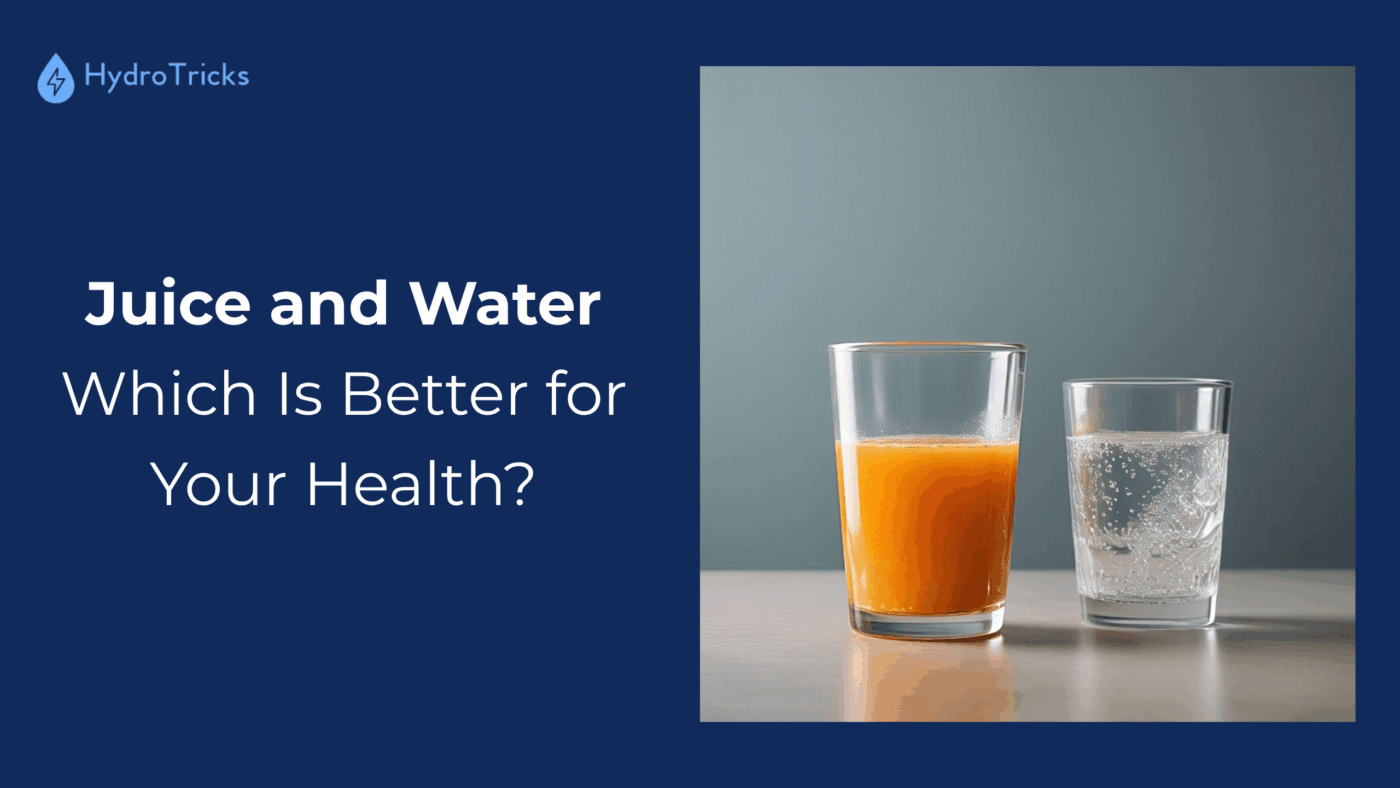In today’s health-conscious world, the debate between juice and water has taken center stage, sparking discussions among wellness influencers, nutritionists, and fitness enthusiasts alike. Both beverages are often praised for their unique benefits—juice for its vitamin-rich, flavorful boost, and water for its unmatched hydration and calorie-free purity. But with so much conflicting information, choosing the right drink for your health can be confusing. Should you stick with nature’s most essential beverage—water—or opt for nutrient-packed fruit juices? This comprehensive guide compares juice and water, explores the rising trend of hydrogen water, and helps you make the smartest choice for your wellness goals.
Juice vs. Plain Water: A Nutritional Breakdown
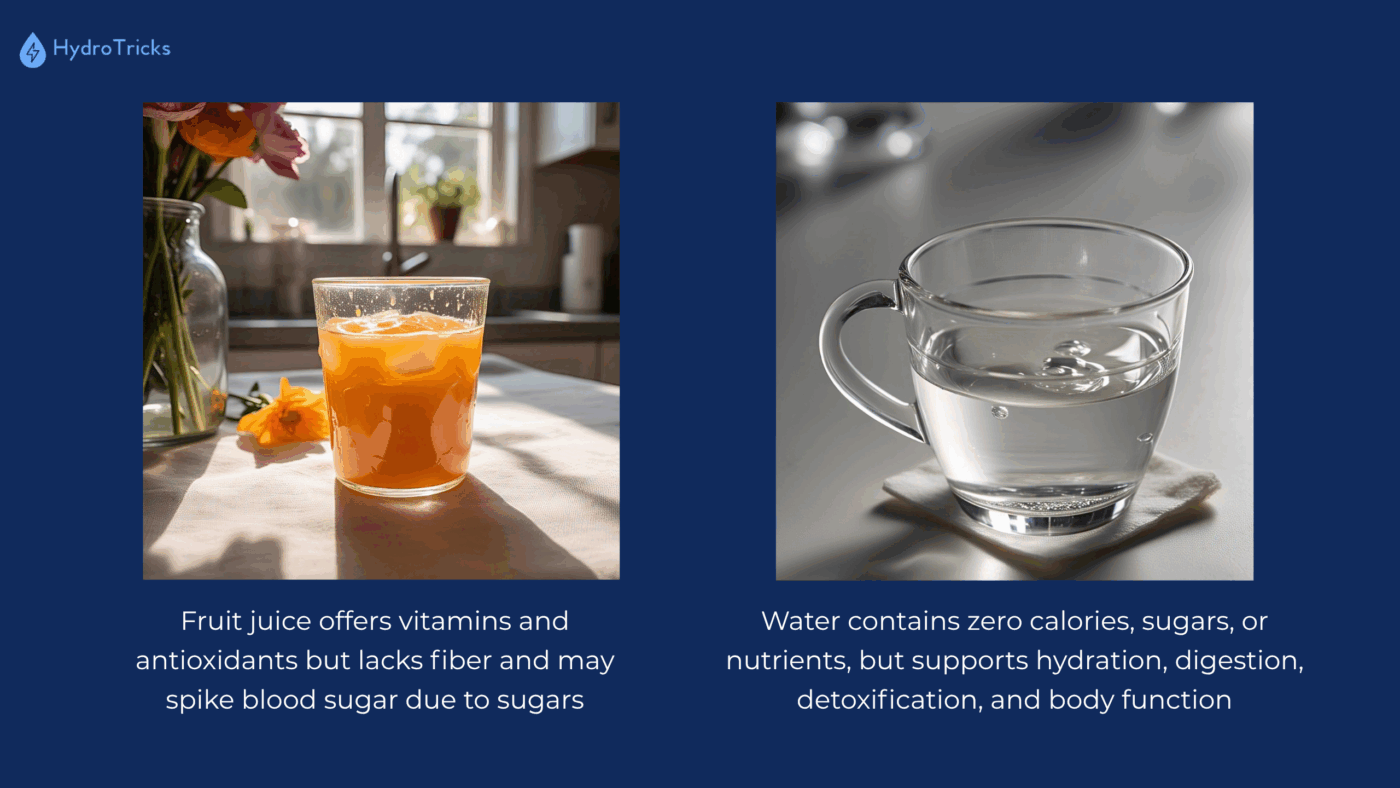
To begin comparing juice and water, we need to take a closer look at their individual nutritional profiles. Both offer health benefits, but the differences in calories, sugar content, and overall hydration effectiveness are significant.
Fruit juice is often celebrated for its rich concentration of vitamins, minerals, and antioxidants. For example, orange juice delivers a high dose of vitamin C and potassium, which support immune health and electrolyte balance. Pomegranate juice is another powerhouse, offering polyphenols known for their anti-inflammatory and antioxidant properties. However, fruit juice also contains a high amount of natural sugars, such as fructose, and these sugars are absorbed rapidly into the bloodstream. This can cause sudden spikes in blood sugar levels, especially when juice is consumed in large quantities. Additionally, juicing removes the fruit’s natural fiber—an important component for digestion and satiety.
Plain water, by contrast, contains zero calories, sugars, or nutrients. But what it lacks in flavor or micronutrients, it makes up for in essential functions. Water supports nearly every biological process in the body, from nutrient transport and temperature regulation to toxin removal and joint lubrication. It also aids in digestion and helps maintain skin and organ health.
When evaluating juice and water for daily hydration, plain water clearly stands out. It provides pure hydration without the potential drawbacks of sugar or excess calories. While juice can be a nutritious treat, water should remain your go-to beverage for optimal health and hydration.
Cons and Pros of Water
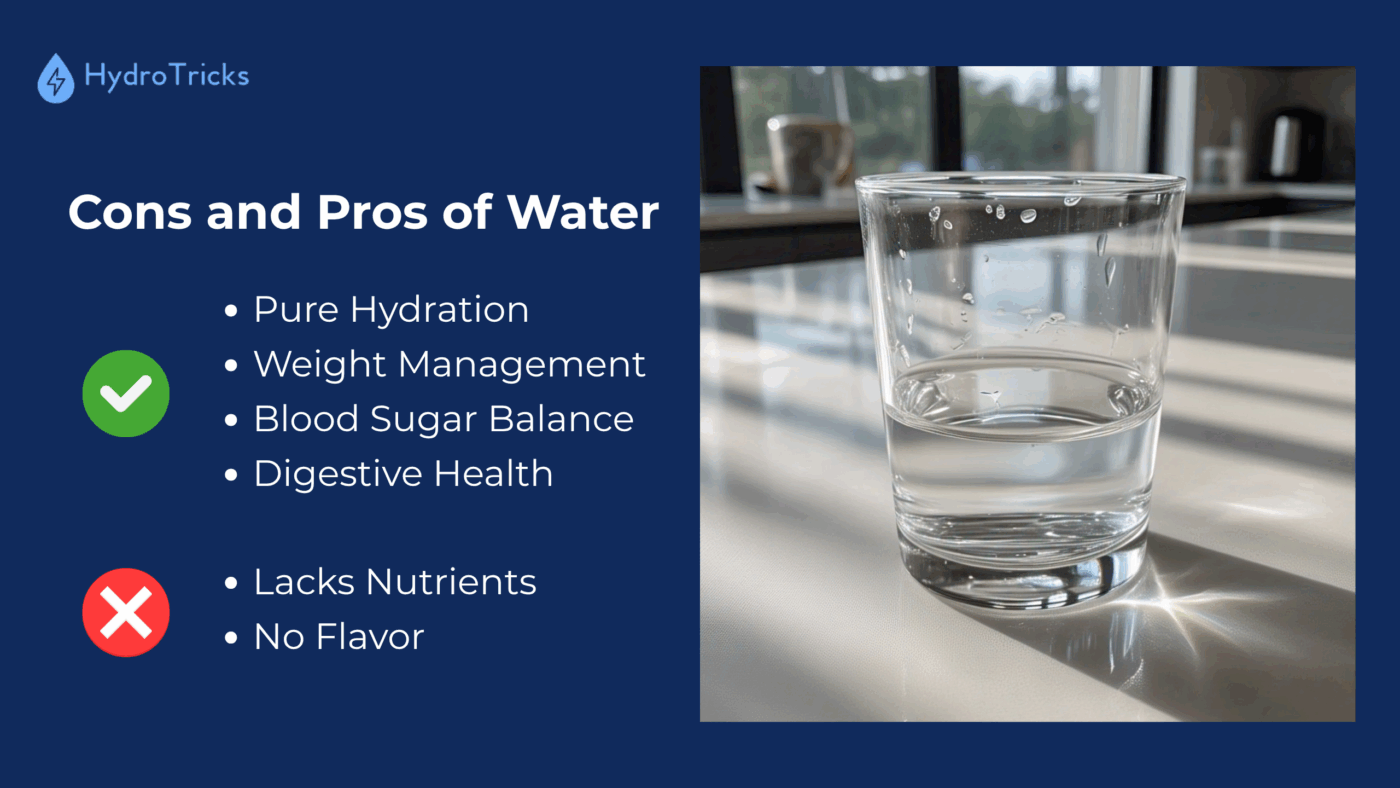
Pros of Water
- Pure Hydration:Water delivers essential hydration without added sugars, calories, or additives. It supports vital functions like regulating body temperature, keeping skin clear and hydrated, and maintaining joint lubrication.
- Weight Management:Replacing sugary drinks or juice with water can significantly reduce daily calorie intake, making it an effective choice for those focused on weight loss or maintaining a healthy weight.
- Blood Sugar Balance:Unlike juice, water has no impact on blood glucose levels, making it ideal for stable energy throughout the day and suitable for individuals managing diabetes or insulin sensitivity.
- Digestive Health:Drinking enough water supports healthy digestion, aids nutrient absorption, and helps prevent constipation, all without disrupting the balance of gut bacteria.
Cons of Water
- Lacks Nutrients: Water does not provide vitamins, minerals, or antioxidants, which are present in moderate amounts in 100% fruit juices.
- Flavor: Some individuals find plain water bland or unappealing, which can make it challenging to drink enough daily—especially for those who prefer flavorful beverages.
Cons and Pros of Juice
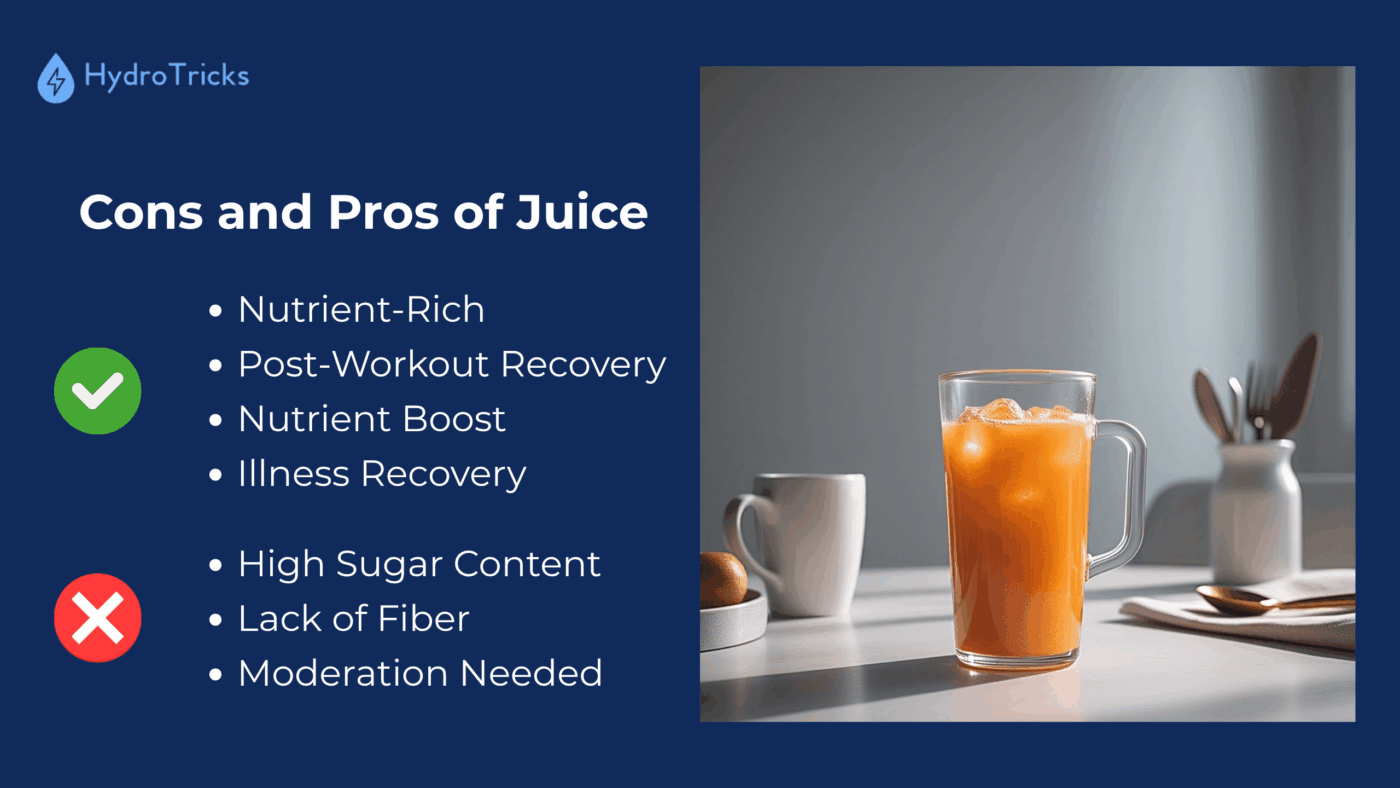
Pros of Juice
- Nutrient-Rich: Juices like orange, pomegranate, and grape are packed with vitamins (like vitamin C), minerals (such as potassium), and antioxidants that support immune health, heart function, and cellular repair.
- Post-Workout Recovery: Certain juices—especially tart cherry, watermelon, or beet juice—are known to reduce muscle soreness, replenish electrolytes, and support faster recovery after exercise.
- Nutrient Boost: For individuals who struggle to meet their daily fruit and vegetable intake, a small glass of 100% juice can provide a concentrated dose of essential nutrients in an easy-to-consume format.
- Illness Recovery: When solid food is hard to digest during illness, juice offers quick energy and hydration while delivering immune-supportive vitamins.
Cons of Juice
- High Sugar Content: Even without added sugars, natural fruit juices are high in fructose, which can lead to rapid spikes in blood sugar and increase overall calorie intake.
- Lack of Fiber: Juicing removes most of the fiber from whole fruits, reducing their digestive and satiety benefits.
- Moderation Needed: Regular consumption of large quantities of juice may contribute to weight gain and poor blood sugar control, especially for those with metabolic concerns.
What About Hydrogen Water?

Now that we’ve covered the basics of juice and water, it’s time to discover a rising star in the hydration world—hydrogen water. This innovative option is simply pure water infused with molecular hydrogen (H₂), a powerful antioxidant with unique health-promoting properties.
Unlike juice, hydrogen water delivers these benefits with zero sugar, zero calories, and no impact on blood glucose levels. It offers the clean hydration of water while adding potential wellness advantages that go far beyond basic refreshment.
Benefits of Hydrogen Water
- Reduces Oxidative Stress: Molecular hydrogen neutralizes harmful free radicals in the body, helping to combat cellular damage linked to aging and chronic disease.
- Supports Cellular Health: By improving cellular function and reducing inflammation, hydrogen water may help boost vitality and resilience.
- Enhances Athletic Recovery: Studies suggest hydrogen water can reduce muscle fatigue, soreness, and inflammation after exercise, promoting faster recovery.
- Improves Energy and Focus: Users often report increased mental clarity, reduced brain fog, and a general sense of alertness.
- Boosts Metabolic Health: Preliminary research indicates potential support for healthy blood sugar regulation and fat metabolism.
- Promotes Skin Hydration: Some studies suggest it may improve skin elasticity and hydration from within.
- Calorie-Free Antioxidant Source: Delivers antioxidant benefits without the sugar or calories found in fruit juices.
Hydrogen water offers a functional upgrade to traditional hydration, combining clean drinking water with science-backed benefits that support long-term wellness. In the ongoing juice and water debate, hydrogen water stands out as a superior choice for those seeking enhanced hydration and health benefits.
Meet HydroWata: The Future of Hydration
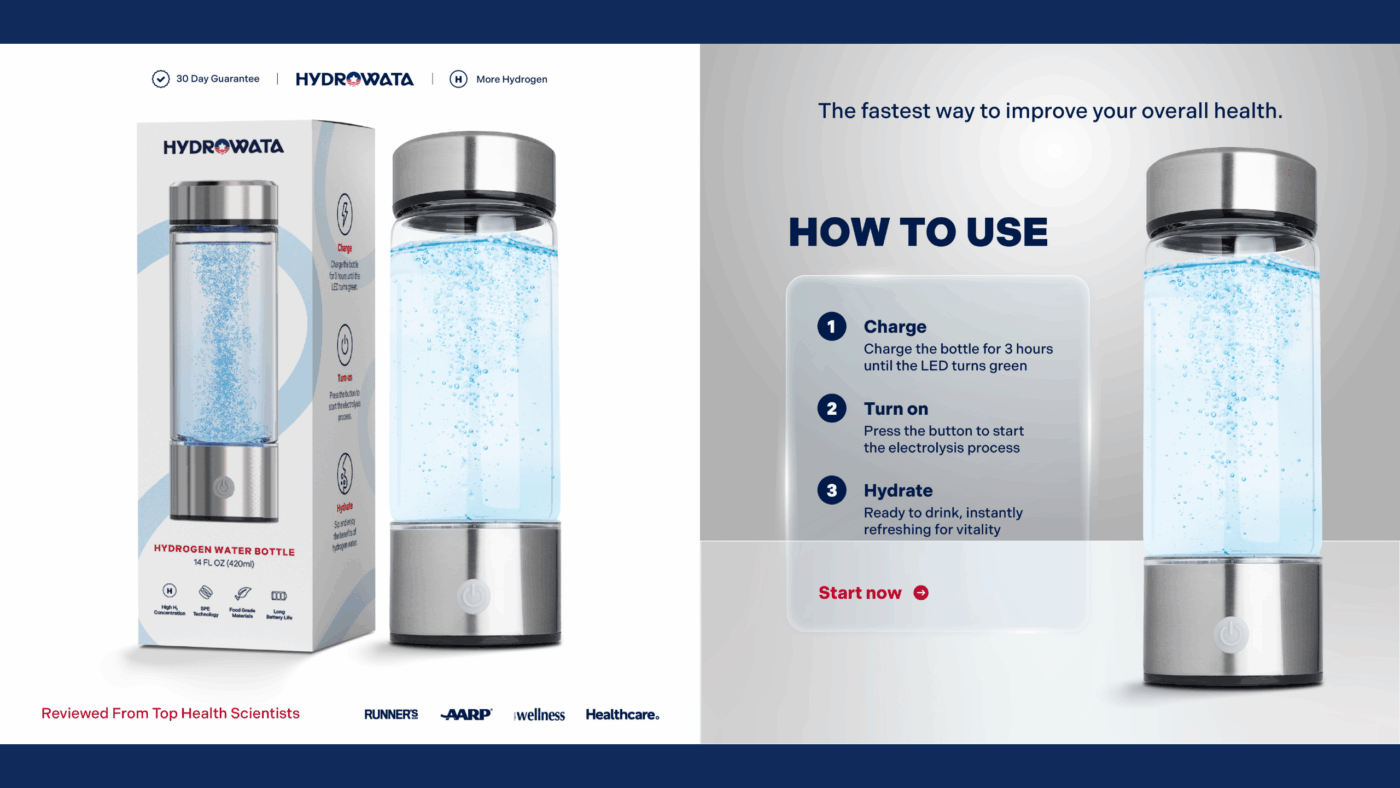
For those curious about unlocking the benefits of hydrogen water, the HydroWataHydrogen Water Bottle offers an innovative, convenient solution. Designed with active lifestyles in mind, HydroWata transforms ordinary water into hydrogen-rich water within minutes, making it easier than ever to boost your hydration with powerful antioxidants on the go. Whether you’re comparing juice and water or exploring hydrogen water, HydroWata provides a smart way to enhance your daily hydration routine.
Key Features of HydroWata Hydrogen Water Bottle:
- Portable Design: Lightweight and compact, HydroWata Hydrogen Water Bottle fits perfectly in your gym bag, hiking pack, or work desk, making it ideal for commuters and fitness enthusiasts alike.
- Advanced Electrolysis Technology: HydroWata uses state-of-the-art electrolysis to infuse water with a high concentration of molecular hydrogen quickly and efficiently, ensuring every sip delivers maximum health benefits.
- Durable and Rechargeable: Built with premium materials, the bottle is designed for daily use and includes a convenient USB charging system, so you never run out of hydrogen-enhanced water.
- Health-Focused Hydration: HydroWata provides pure, clean water infused with beneficial hydrogen, free from additives, sugars, or calories—bridging the gap between juice and water by offering a smarter hydration alternative.
By choosing HydroWata, you’re embracing the future of hydration—one that combines the simplicity of water with cutting-edge science. Whether you want to support recovery, reduce oxidative stress, or simply enjoy enhanced hydration, HydroWata offers a smart, innovative choice in the ongoing Juice vs. Water conversation.
Considerations Before Choosing between Juice and Water
Before you decide whether juice and water is best for your needs, consider these key factors:
- Your Health Goals: Are you aiming to lose weight, stay hydrated, or boost your antioxidant intake?
- Activity Levels: Athletes may benefit from juice post-workout, but water should still dominate daily intake.
- Dietary Restrictions: If you’re managing diabetes or watching your sugar intake, water or hydrogen water is the safer bet.
- Budget and Convenience: Juice can be expensive, especially if opting for organic, cold-pressed varieties. Water—especially from the tap—is more cost-effective.
No matter your choice, moderation and balance are essential. There’s room for both Juice and Water in a healthy lifestyle, depending on how and when they’re consumed.
Conclusion
The choice between juice and water isn’t an either/or decision—it’s about balance. Drink water consistently throughout the day to stay hydrated and support vital body functions. Enjoy juice in moderation, ideally with meals or after workouts, to benefit from its nutrients without excess sugars. For those seeking advanced hydration, hydrogen water offers promising antioxidant benefits. Ultimately, a healthy lifestyle embraces a variety of drinks like juice and water that nourish your body thoughtfully. Understanding the roles of juice, water, and hydrogen water empowers you to make smarter hydration choices that support long-term wellness. Cheers to healthier sipping!
FAQs
Juice and Water – Which One Is Healthier?
When comparing juice and water, the answer depends on your health goals. Juice offers nutrients but contains sugar; water hydrates without calories. Both have benefits, but water is generally healthier daily.
Can I drink too much juice?
No. Excessive juice intake can lead to weight gain, blood sugar spikes, and even dental issues. Stick to small servings of 100% juice.
How much water should I drink daily?
General guidelines suggest 8 cups (about 2 liters) per day, but needs vary depending on age, weight, activity level, and climate.
What makes HydroWata different?
HydroWata uses advanced electrolysis technology to quickly produce high-concentration hydrogen water. It’s portable, rechargeable, and user-friendly.

